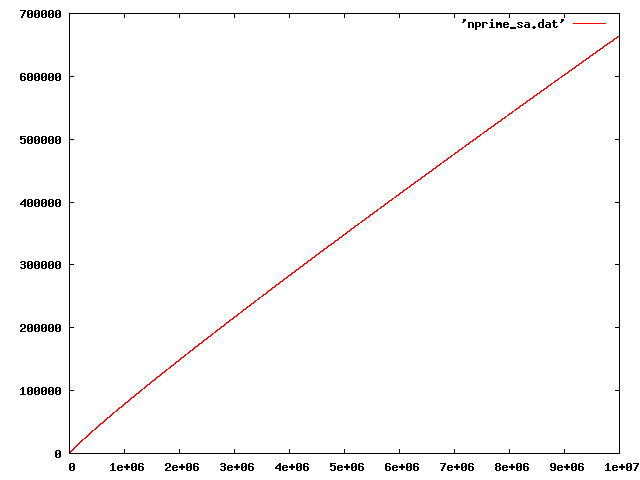 HOME
HOME Try Sather
Try Sather 2. Installing Sather
2. Installing Sather Post Messages
Post Messages
 HOME
HOME |
 Try Sather
Try Sather |
 2. Installing Sather
2. Installing Sather |
 Post Messages Post Messages |
Sather code often performs better than the corresponding C++ code. To see it is true, I wrote a simple time consuming program which uses features of Sather and C++. The program is to enumerate the number of primes. Found primes are stored in a list.
01: // g++ -O2 nprime.cpp -o nprime_cpp 02: #include <iostream> 03: #include <vector> 04: 05: #define W 500 06: 07: using namespace std; 08: 09: 10: inline bool primep(vector<int>& plist, int i){ 11: for( vector<int>::iterator iter = plist.begin();iter != plist.end(); iter++){ 12: int j = *iter; 13: if(j*j>i) return true; 14: if(i%j==0) return false; 15: } 16: } 17: 18: void nprime(int m){ 19: vector<int> plist; 20: plist.push_back(2); 21: plist.push_back(3); 22: for(int j =5, r=3; j <= m; j+=2, r++){ 23: if(primep(plist, j)) plist.push_back(j); 24: if(r==W){ 25: cout << j << " " << plist.size() << "\n"; 26: r = 0; 27: } 28: } 29: } 30: 31: int main(int ac, char** av){ 32: if(ac ==2){ 33: int m = atoi(av[1]); 34: if(m > 10000){ 35: cout << "#Limit, N of primes\n0 0\n"; 36: nprime(m); 37: return 0; 38: }else{ 39: cerr << "limit should be > 10000\n"; 40: } 41: }else{ 42: cerr << "Usage: nprime_cpp N\n"; 43: } 44: }
$ g++ -O2 nprime.cpp -o nprime_cpp $ time ./nprime_cpp 10000000 > nprime_cpp.dat real 0m8.365s user 0m8.245s sys 0m0.004sIt takes only 8.365 second. Pretty fast.
01: -- primitive counting prime numbers program 02: -- sacomp -O_fast nprime.sa -o nprime_sa 03: 04: class MAIN is 05: attr plist :LIST{INT}; 06: const w:INT := 500; 07: 08: private primep(i:INT):BOOL is 09: j:INT; 10: 11: loop 12: j :=self.plist.elt!; 13: if j * j > i then 14: return true; 15: end; 16: if i % j = 0 then 17: return false; 18: end; 19: end; 20: end; 21: 22: 23: nprime(maxi:INT) is 24: j,r:INT; 25: self.plist := #(|2,3|); 26: r := 3; 27: loop 28: j := 5.step!((maxi-3)/2, 2); 29: if self.primep(j) then 30: self.plist.append(j); 31: end; 32: if r = w then 33: #OUT + j + " " + self.plist.size + "\n"; 34: r := 0; 35: end; 36: r := r+1; 37: end; 38: end; 39: 40: main(av:ARRAY{STR}) is 41: if av.size = 2 then 42: m:INT := av[1].cursor.get_int; 43: if m <= 10000 then 44: #ERR + "limit should be > 10000\n"; 45: else 46: #OUT +"# limit, N of primes\n0 0\n"; 47: nprime(m); 48: end; 49: else 50: #ERR + "Usage: nprime N\n" 51: end; 52: end; 53: end;The algorithm is completely the same as that of the C++ version.
$sacomp -O_fast nprime.sa -o nprime_sa $time nprime_sa 10000000 > nrpime_sa.dat real 0m14.262s user 0m11.617s sys 0m0.016sIt takes 14.262 second. It is also pretty fast but slightly slower than the C++ version. I may be just because the program is not large enough. Nevertheless, it is much faster than those written in Python and Scheme, indicating that Sather is an attractive language with easy writing and fast speed. If you need more speed you can combine Sather and C or Fortran easily.

Figure 1 shows Number of primes as a function of number, which shows that density of primes decreases as number increases gradually.
The readability of Sather is much better than those of C and C++, which is apparent in large scale programs.
I am wondering why Sather is so minor?
 HOME
HOME |
 Try Sather
Try Sather |
 2. Installing Sather
2. Installing Sather |
 Post Messages Post Messages |